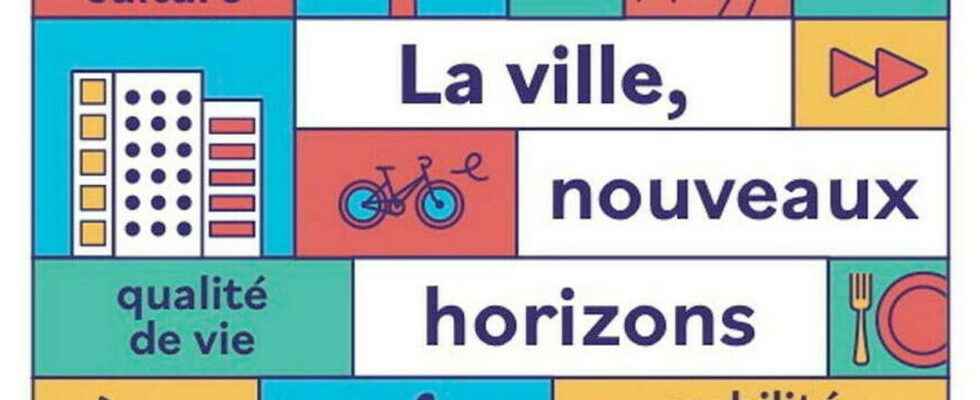It is said to be dead, hated, hostile, polluted, noisy, on the verge of being abandoned after three brutal confinements. The city is all that, of course, but it remains the heart of human exchanges, nocturnal festivities, economic activity, unexpected encounters, unprecedented cultural creations. From then on, the city is committed to rekindling the flame, to giving back all their place to the working classes, to seniors, to businesses, to children, to workers, and more broadly to all the heralds of the desirable city.
Our event The city, new horizons was held this Friday, November 18, at the Mediterranean University Center in Nice. Did you miss the appointment? Find on this same page as well as on our social networks (Facebook, TwitterDailymotion) all the round tables!
The city, new horizons 2022.
5:15 p.m. – The city, new horizons: curtain!
The third edition of our forum dedicated to the city ends here.
Thank you for having followed, many, this live.
See you next year !
4:49 p.m. – Do we have the right to grow old in town?
“The main problem today is that of the invisibilization of the elderly, in the city as well as in public debate and social facts. There is this involuntary and implicit relegation, tip Jerome Guedjsenior civil servant and deputy, author of Advocacy for the elderly. People over the age of 60 represent 20% of the French population! However, cities were not designed, historically, to deal with the major phenomenon we are witnessing: the longevity revolution…”
4:40 p.m. – What place for seniors in the city?
They too seem to have disappeared from the streets of our cities, towns and suburbs. Like the youngest, seniors have deserted our public space. Forced to leave apartments with sometimes disproportionate rents, fearful of criminality deemed to be growing, socially isolated in the face of the disappearance of old ties of sociability, nostalgic for meeting places that have been gradually replaced, our elders are now hiding. What to do not to leave aside the more than 17 million elderly French people?
With Jerome Guedjsenior civil servant and deputy, author of Advocacy for the elderly, Serge Triganofounder of Mama Shelter and Casa Barbara, Omar Beloucifmedical director of the La Poste group and Jennifer Salles Barbosadeputy mayor of Nice, metropolitan councilor Nice-Côte d’Azur and vice-president of the CCAS of Nice.
4:35 p.m. – Which city for the elderly
With the aging of the population, more and more elderly people live in cities. Therefore, how to make the latter more adapted to their constraints but also to their needs? Listen Omar Beloucifmedical director of the La Poste group, share his leads, ahead of his intervention.
4:17 p.m. – Genesis and uses of walking
Jerome Monnet, a geographer-urban planner specializing in the use of public space and co-director of the Paris School of Urban Planning, returns for our audience to the origins of walking (utility and “leisure”). But also evokes the different practices (walking, jogging…), the democratization of its activity and its reinforcement in the metropolises. A stroll through the history of walking!
4:00 p.m. – Every man for himself, and the pedestrian in danger? How to make the city desirable to walkers again
Cyclists against motorists and motorized two-wheelers: the mobility war seems to have drawn a clear boundary between two camps deemed irreconcilable. Firmly encamped in their trenches, they opposed each other in everything. But at the heart of no man’s land of this conflict, a figure seems to be forgotten by all: the pedestrian, who is nevertheless a large majority in the metropolises. Endangered on the sidewalks, forgotten by public policies, the urban walker has few defenders. How to change this?
With Jerome Monnetgeographer-urban planner specializing in the use of public space and co-director of the Paris School of Urbanism.
3:30 p.m. – Natural risks: towards an architecture of care
Eric Daniel-Lacombearchitect, urban planner, professor at the National School of Architecture of Paris-La Villette, tells about this meteorological bomb that occurred on October 3, 2020 and shares with our public his work on floods.
“The day after storm Alex, in the Roya valley, there were rocks everywhere. The water washed away pieces of the mountain. So when you end up with rocks the size of a house, the subject is shelter. » Eric Daniel-Lacombe https://t.co/okwwfwALv7 pic.twitter.com/nBJrrVJmCB
— The Point Events (@LePointEvents) November 18, 2022
3:22 p.m. – Floods, accidents: is there a Mediterranean architecture in the face of risks?
The people of Nice know this reality better than anyone: in the era of climate change, environmental risks are multiplying and hovering over a large part of the Mediterranean area. Rising waters, exceptional rainy episodes, violent storms are now their daily lives. Two years after Storm Alex, how can we adapt to these new dangers?
With Eric Daniel-Lacombearchitect, urban planner, professor holding the “New urbanities in the face of natural risks” chair at the National School of Architecture of Paris-La Villette.
3:13 p.m. – Demonization of construction?
“Building mayors are often stigmatised. As soon as they build, ecology, nuisance are evoked… Construction gets in the way. We want construction, but not too close to home, so that we don’t see it…”, observes Guillaume Martinaudpresident of Orpi, a French cooperative real estate network.
2:55 p.m. – Difficult beginnings of the month: how to control the madness of real estate prices in the city
Apartments above 5,000 euros per square meter, and rentals in the city center that have become inaccessible to the vast majority of the population: this is the reality of many metropolitan residents, a daily life that Parisians are no longer the only ones to know . From Bordeaux to Nice, real estate prices continue to rise, despite numerous attempts at regulation. What crest line can we find between support for construction, new climatic constraints, and freedom of purchase and investment?
With Guillaume Martinaudpresident of Orpi, a French cooperative real estate network.
